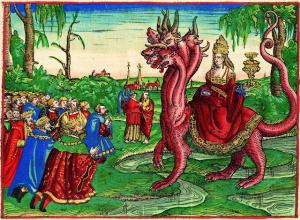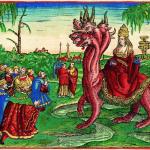Miracle of the Sun at Fatima
The late Steve Hays (1959-2020) was a Calvinist (and anti-Catholic) apologist, who was very active on his blog, called Triablogue (now continued by Jason Engwer). His 695-page self-published book, Catholicism — a collection of articles from his site — has graciously been made available for free. On 9 September 2006, knowing full well my history of being condemned and vilified by other anti-Catholics (and his buddies) like James White, Eric Svendsen, and James Swan, Hays was quite — almost extraordinarily — charitable towards me. He wrote then:
I don’t think I’ve ever accused him of being a traitor or apostate or infidel. . . . I have nothing to say, one way or the other, regarding his state of grace. But his sincerity is unquestionable. I also don’t dislike him. . . . I don’t think there’s anything malicious about Armstrong—unlike some people who come to mind. In addition, I don’t think I’ve ever said he was unintelligent. For the record, it’s obvious that Armstrong has a quick, nimble mind. . . . The term “apostasy” carries with it a heavy presumption that the apostate is a hell-bound reprobate. I think it’s unwarranted to assume that all Catholics or converts to Catholicism are damned.
Two-and-a-half years later, starting in April 2009 and up through December 2011 (in the following quotations) his opinion radically changed, and he claimed that I have “an evil character,” am “actually evil,” “ego-maniac, narcissist,” “idolater,” “self-idolater,” “hack who pretends to be a professional apologist,” given to “chicanery,” one who doesn’t “do any real research,” “a stalwart enemy of the faith . . . no better than [the atheists] Richard Dawkins or Christopher Hitchens,” with an intent to “destroy faith in God’s word,” “schizophrenic,” “emotionally unhinged,” one who “doesn’t trust in the merit of Christ alone for salvation,” “has no peace of mind,” “a bipolar solipsist,” “split-personality,” and a “bad” man. He wasn’t one to mince words! See more gory details.
I feel no need whatsoever to reciprocate these silly and sinful insults. I just wanted the record to be known. I’ve always maintained that Hays was a very intelligent man, but habitually a sophist in methodology; sincere and well-meaning, but tragically and systematically wrong and misguided regarding Catholicism. That’s what I’m addressing, not the state of his heart and soul (let alone his eternal destiny). It’s a theological discussion. This is one of many planned critiques of his book (see my reasons why I decided to do this). Rather than list them all here, interested readers are directed to the “Steve Hays” section of my Anti-Catholicism web page, where they will all be listed. My Bible citations are from the RSV. Steve’s words will be in blue.
*****
[Chapter 1: Miracles]
“The miracle of the sun”
Hays cited a remarkably articulate eyewitness account of this miracle, from Dr. Gonçalo de Almeida Garrett, Professor of Natural Sciences at Coimbra University.
So you might say that the miracle of the sun is the trump card among Catholic miracles. They don’t get any better than this. Indeed, nothing else approaches the level of public attestation. [p. 25]
Yes, it was a pretty amazing occurrence: tough for Protestants to match. Hays cites Stanley Jaki and Karl Rahner writing some semi-skeptical remarks concerning how many actually witnessed the miracle and wrote about it. Fair enough. But if less saw it than the reported 70,000, that’s no disproof of the miracle itself; it would only mean that it was not as well-attested as most advocates think it is. Jesus’ resurrection was no less true at the moment that only Mary Magdalene was a witness of the risen Jesus, than after more than 500 saw Him.
One ironic point of tension is not that so many observers witnessed this phenomenon, but so few did. For even if tens of thousands of people saw it, it was a geographically limited phenomenon. [p. 27]
So are almost all other miracles. But I get what he is insinuating: this had to do with the sun: visible by millions. The miracle was not necessarily in the sun itself, but could have been merely in people’s perception of it. Either thing is miraculous and out of the ordinary. But the latter would explain why people all over the world didn’t see it. Many Protestants have made a similar analysis about the “sun standing still” miracle (?) with Joshua in the Old Testament.
In addition to the evidence for the miracle of the sun, there is a certain amount of evidence to the contrary. This takes different forms: i) The fact that the Vatican has withheld a formal endorsement of the miracle. If the Vatican isn’t prepared to stick its neck out, why should we? [p. 34]
This is simply the traditional slowness and reluctance of the Church to positively pronounce on alleged miracles: especially those that occur within an event that is part of private, rather than public revelation. It’s not the same thing as being outright skeptical of a miracle or “against” it: only taking proper precautions and being prudent. I contend that this is not, in fact, “evidence to the contrary,” as Hays puts it, anymore than Doubting Thomas’ reservation about believing that Jesus had risen was any sort of “evidence to the contrary” regarding Jesus’ resurrection.
He simply required a higher level of (empirical proof) — and Jesus provided it, as it turned out. Likewise, the Church in her official capacity as judge of purported miracles is rightfully slower and desiring of relatively more evidence before making definitive pronouncements. In other words, the judgment of the entire Church is much different in character than the judgment or pious belief and acceptance of one person. It’s an altogether good thing that the Church is slow in these matters, seeing that there are indeed falsely alleged miracles and also demonic miracles, as Hays also noted. The Church wisely knows that belief in either is very harmful to the spiritual life and persons.
Conflicting reports of what was seen on October 13, 1917. [p. 34]
If in fact, the miracle was such that it occurred within each individual’s perception (as I’m strongly inclined to believe, because Marian apparitions are largely of the same nature: one person sees Mary and the next one doesn’t, etc.), then there could be differing accounts without undermining the actuality of the general phenomenon: experienced somewhat differently by various individuals.
Reports of repeated phenomena. This would not, of itself, undermine the factuality of the event. Rather, it would undermine the miraculosity of the event. For if the event is a natural phenomenon which is only miraculous due to its providential timing, then repetition undercuts the distinctive timing of the event. [p. 34]
Actually (in strict logic) it wouldn’t. The providential timing of the original occurrence still is what it is, and is valid, whether similar events happen later or not. As an analogy, I made the argument in my book about biblical archaeology, The Word Set in Stone (2023) that the parting of the Re[e]d Sea could have been a natural event, called a wind setdown, which has been discussed in scientific journals, and observed. If so, it was providential, in the sense that it occurred at precisely the time that it needed to occur, to save the fleeing Hebrews.
When God told Moses, “Lift up your rod, and stretch out your hand over the sea and divide it, that the people of Israel may go on dry ground through the sea” (Ex 14:16), God (being out of time and omniscient) knew that the natural event would happen at this particular time. This would make the parting (if this theory is correct), “miraculous due to its providential timing.” But do similar later events undermine the first one? No. It was what it was, and it was miraculous in the specific sense that Hays describes. In fact, there was another “water parting” forty years later: of the Jordan River (which I also argue was natural). But that has no “negative” bearing on the first event.
Therefore, purported additional instances of persons seeing other strange manifestations in the sun not too long afterwards do not disprove in the slightest, the first well-known occurrence. If anything, they would reinforce it, being similar in nature. Hays tries very hard to cast doubt on the miracle with all these skeptical claims. But if each and every one is illogical and/or irrelevant (a non sequitur in logic), it matters not a whit how many there are. They simply miss the mark and accomplish nothing. This is the technique humorously described as continually throwing manure at a wall, hoping some will stick (employed also by lawyers burdened with a bad case, short on the facts and evidence.
Catholics are apt to treat the sun-miracle as genuine, Evangelicals as diabolical, secular sceptics as a paradigm-case of mass hallucination, and ufologists as a flying saucer. [p. 37]
Very true. We must examine the strength of the arguments made by those in all parties. Hays has certainly not proven that the miracle is “diabolical” so far, and I am quite confident that he will fail to do so altogether.
Due to the geographical confinement of the phenomena, the most plausible interpretation construes the event as a rare, but naturally occurring event. What would render it miraculous is the timing of the event, rather than the nature of the event. . . . According to reports, not everyone present even witnessed the miracle of the sun. [p. 38]
Again, Hays neglects the possibility of God changing the perceptions of persons, so that they see things that were not literally in the sun itself. It’s just as miraculous (though arguably not as spectacular or “earth-shaking” in nature). This is biblical, too. Mary Magdalene (“she . . . saw Jesus standing, but she did not know that it was Jesus”: Jn 20:14) and the two disciples on the road to Emmaus (“And their eyes were opened and they recognized him”: Lk 24:31) didn’t recognize the risen Jesus at first. If God can miraculously cause people not to see things, He can also miraculously cause them to see extraordinary things that others do not or may not see.
Prior religious conditioning clearly had a shaping influence on the interpretation of the apparently numinous encounters. [p. 38]
That’s true of all reputed miracles, and also, I might add, of much of biblical interpretation and theology itself; so it proves (or disproves) nothing. One must still look at all relevant factors and the merits of the case.
Why would Mary predict the future, but bind the recipient to secrecy? To reveal a prediction after the fact undermines the evidential value of the oracle. Anyone can predict the future as soon as the future is past! [p. 38]
There are several conceivable reasons. There is a thing called prudence: maybe it wasn’t good for everyone to know all the secrets immediately. Facts are often withheld from the public in order to avoid negative consequences. It may have been something akin to what Jesus told His disciples: “To you has been given the secret of the kingdom of God, but for those outside everything is in parables” (Mk 4:11; cf. Mt 13:11; Lk 8:10). God (and God speaking through Mary) has His reasons for everything. Often, they are beyond our comprehension and understanding. The gospel itself was a “mystery which was kept secret for long ages” (Rom 16:25). Sometimes a prophecy is given to just one person, such as Samuel telling Saul that he was to die the next day in battle, or God telling Abraham that his descendants would number as many as the stars.
According to the Vatican, the apparitions at Fatima were subjective visions. Subjective visions, even if veridical for the recipient, are hardly veridical for a second party. [p. 38]
Exactly! That’s precisely why the Church makes a stark distinction between private and public revelations. The individual Catholic is not bound at all to accept private revelations. But some are relatively more “established” in the Catholic life and milieu than others, and these include the apparitions of Lourdes and Fatima. We are free to believe that these persons did indeed experience subjective visions, just as Paul did in the Bible:
2 Corinthians 12:1-4 . . . I will go on to visions and revelations of the Lord. [2] I know a man in Christ who fourteen years ago was caught up to the third heaven — whether in the body or out of the body I do not know, God knows. [3] And I know that this man was caught up into Paradise — whether in the body or out of the body I do not know, God knows — [4] and he heard things that cannot be told, which man may not utter.
Paul also heard the Lord speak to him at his dramatic conversion (Acts 9:4; 22:8), whereas his companions heard none of the words (22:9). this is in inspired Scripture, so the Christian must believe it, but say we had no Bible yet, and Paul told us this? Would we be strictly bound to accept it? Maybe not. But if we did, it would have to be strictly based on his word and trustworthy character, etc. We might argue that since he did other miracles, we can trust him for accurately reporting this one.
Private revelations can be delusive. [p. 38]
They can, and they can also be true, as in many revelations of this sort recorded in the Bible.
Private revelations lack the binding force of public revelation. [p. 38]
Yep, but again, that is a separate question from the evidence of the miracle occurring or not. This factor does not in an of itself work against the truthfulness of a purported occurrence.
Should an Evangelical take the position that God would never answer the prayer of a Catholic? I don’t see why. If God could bless an atheist, why not a Catholic? So even on the most uncharitable reading, I wouldn’t rule out the possibility of Catholic miracles—although we must still judge
the claim on a case-by-case basis. [pp. 42-43]
This is very good: open-minded and fair-minded. Credit where it is due . . . There are many Protestant thinkers who could and would never have written the above statement.
For example, another problem with the miracle of the sun is that if the purpose of this event was to attest Marian dogma, then it was a rather roundabout and ultimately ambiguous way of making the point. Would it not have been more to the point for Mary to simply put in a public appearance to 70,000 onlookers? Complete with photographers? There is, after all, no internal relation between the Virgin Mary and a solar phenomenon. So why choose such an oblique method of getting the message across? [p. 44]
Would it not have been more to the point for Jesus to simply put in a public appearance (in His resurrected state) to everyone in Jerusalem? Would it not have been more to the point for Jesus to put in many more public appearances and commence His ministry before the age of 30 or so? How many more people could have been reached?! But He chose not to. He spent almost all of His time for some thirty years with His parents. God has His reasons for everything. I may not understand why Mary didn’t do as Steve proposes. But I also don’t understand why Jesus didn’t do what seems to be analogous to Steve’s proposal. It’s a wash, in other words.
It’s better to accept mystery and our obvious limitations in spiritual matters and to not expect that we can explain all things pertaining to God and miracles (the error of hyper-rationalism). Paul desperately wanted God to take away his “thorn,” and asked Him three times to do so. God said no and that His “grace is sufficient” and never explained to Paul why and how. I’ll have lots of question for God and Paul and Mary and many others if and when I get to heaven (as a naturally curious and inquisitive person). But I will not belabor such questions in this life: especially not in public. I humbly bow to His infinite wisdom and thank Him for His amazing love and mercy and grace, recognizing my proper lowly place in the overall scheme of things.
If Hays wouldn’t be so skeptical about analogous biblical things concerning Jesus, he ought not be, by the same token, to purported apparitions of Mary and the miracle of the sun. Such reasoning is simply not a disproof of the alleged miracle. “Why doesn’t God [and those whom He uses for His purposes] do this or that?” rarely is a compelling argument.
In Deut[eronomy] 13:1-5, we have a programmatic statement regarding the relation between miracle and doctrine. [p. 45]
But the larger point is lies in the purpose of the miracle, as a test of faith. Regardless of whether the cause is directly attributable to God or the dark side, the overarching purpose is to test the spiritual allegiance of the covenant community. Are its members loyal to the true God, or false gods? [p. 46]
Let’s take a look at the passage he brings up:
If a prophet arises among you, or a dreamer of dreams, and gives you a sign or a wonder, [2] and the sign or wonder which he tells you comes to pass, and if he says, ‘Let us go after other gods,’ which you have not known, ‘and let us serve them,’ [3] you shall not listen to the words of that prophet or to that dreamer of dreams; for the LORD your God is testing you, to know whether you love the LORD your God with all your heart and with all your soul. [4] You shall walk after the LORD your God and fear him, and keep his commandments and obey his voice, and you shall serve him and cleave to him. [5] But that prophet or that dreamer of dreams shall be put to death, because he has taught rebellion against the LORD your God, who brought you out of the land of Egypt and redeemed you out of the house of bondage, to make you leave the way in which the LORD your God commanded you to walk. So you shall purge the evil from the midst of you.
The only “doctrine” dealt with here that I see, is monotheism, which, of course, is completely agreed-upon by Catholics, Protestants, and Orthodox (as well as Jews and Muslims). So that has no bearing on our present dispute. If Hays had found Sister Lucia saying that Mary told her that there is more than one God, then he would have a huge point, and Catholics would have to either reject the Fatima apparitions altogether, or (if they are thought to be true) become Protestants or Orthodox. Thankfully, Mary taught no such thing in these apparitions.
Suppose, for the sake of argument, that the miracle of the sun is a genuine miracle. Suppose, further, that it’s a Catholic miracle in the sectarian sense. If various features of Marian dogma (e.g. Assumption, immaculate conception, Mediatrix, Co-Redemptrix, Queen of Heaven, perpetual virginity [ante, in, et post partum]) are contrary to Scripture, then, according to Deut 13 and its NT counterparts, a Christian is obliged to reject the evidentiary status of the miracle. [p. 47]
Again, Deuteronomy 13 only discusses the blasphemous heresy of polytheism. In order for Hays’ point to hold, such passages would have to condemn all of the beliefs above that he rejects. Since they don’t, it’s much ado about nothing. Hays isn’t even in line with his own Protestant forebears. All of the first Protestant leaders accepted the perpetual virginity of Mary. That’s not insignificant. It’s highly significant. The first Protestants didn’t reject all of the Marian beliefs that they had received from Catholicism. Martin Luther accepted a form of the Immaculate Conception, Bullinger believed in the Assumption of Mary, etc. Most accepted calling her Theotokos (“God-bearer”) too.
All of these things have to be discussed individually. I could just as easily argue that if a Protestant gets up and preaches that the Bible teaches sola Scriptura and sola fide (which it never does!: and I endlessly demonstrate that in articles and books), that he should be rejected as a false prophet and expunged from the believing community. This leads us far astray from whether the miracle of the sun or the apparitions at Fatima occurred or not. Hays has provided no compelling reason to think that they did not. Here he’s simply engaging in almost emotional anti-Catholic polemics and rhetoric, knowing that it will get a rise out of Protestant readers (and hope that they won’t notice that the argument has no logical force at all; more sophistry . . .). I provide biblical argumentation for all of these beliefs on my Blessed Virgin Mary web page.
And a Christian is under no obligation to offer an alternative explanation. [p. 47]
That’s right. But if said Christian is seeking to argue that the miracle of the sun did not occur, then he will have his work cut out for him. I’ve seen nothing in his argumentation that would lead me to believe that it did not occur at all. It boils down to Hays having to believe that an articulate witness such as the scientist, Dr. Gonçalo de Almeida Garrett, was a raving lunatic. And that’s the last impression anyone would get in reading his report. This sort of skepticism resembles nothing more than those in the New Testament who said that Jesus cast out demons by Beelzebub (Mt 12:24) and had a demon Himself and was “mad” (Jn 10:20) — rather than simply accept the miracles that He performed.
He doesn’t have to explain what really happened. Or how it happened. Whether the witnesses were deceivers or self-deceived. [p. 48]
Perhaps that explains why Hays never disproved it. He gave us nothing to doubt our present beliefs as Catholics. And that’s how it always goes with his arguments! — as I am showing and will continue to show in this series.
Is Marian dogma contrary to Scripture? That’s a separate argument. It would take me too far afield to address that question. [p. 48]
I completely agree that it is separate question and “far afield” from the present one. That’s absolutely correct. But Hays seemed not to realize that he just fatally undercut his effort to argue that the miracle of the sun couldn’t be accepted simply because it had associations with the dreaded Mary and all of those icky, cooties-laden Catholic Marian doctrines! He got way ahead of himself, was entirely carried away in his polemics and sophism (even considering the level of his usual deficiencies in this regard) and so started forgetting the logical chain of his argument.
On a final note, I’d like to thank Jason Engwer, John Frame, Gary Habermas, and Eric Svendsen for commenting on a brief, preliminary draft of this essay. [p. 49]
I’ll guarantee that he wouldn’t have thanked me for this commentary, even before he decided that I had an “evil character,” etc. He just wanted to hear from his fan club. He never was interested in an actual debate with me: only with toying and engaging in sophistry and mockery. An actual intelligent, civil, point-by-point debate would have been a lot of fun, because it’s a lot of fun for me to take on his thoughts by myself. Everyone who loves theology loves theological challenges (well, almost everyone). Jason Engwer’s still out there writing anti-Catholic apologetics on the blog that Hays began. He could defend his old friend and reply to me. But he won’t. I reply to his articles quite a bit, but he utterly ignores my critiques. I think that’s very sad, and doesn’t indicate (to put it mildly and gently) that he possesses a robust confidence in his own beliefs or his ability to defend them under scrutiny.
***
Practical Matters: Perhaps some of my 4,200+ free online articles (the most comprehensive “one-stop” Catholic apologetics site) or fifty-one books have helped you (by God’s grace) to decide to become Catholic or to return to the Church, or better understand some doctrines and why we believe them.
Or you may believe my work is worthy to support for the purpose of apologetics and evangelism in general. If so, please seriously consider a much-needed financial contribution. I’m always in need of more funds: especially monthly support. “The laborer is worthy of his wages” (1 Tim 5:18, NKJV). 1 December 2021 was my 20th anniversary as a full-time Catholic apologist, and February 2022 marked the 25th anniversary of my blog.
PayPal donations are the easiest: just send to my email address: apologistdave@gmail.com. You’ll see the term “Catholic Used Book Service”, which is my old side-business. To learn about the different methods of contributing, including 100% tax deduction, etc., see my page: About Catholic Apologist Dave Armstrong / Donation Information. Thanks a million from the bottom of my heart!
***
Photo credit: The Whore of Babylon (workshop of Lucas Cranach): colorized illustration from Martin Luther’s 1534 translation of the Bible [public domain / Wikimedia Commons]
***
Summary: The late Steve Hays was a Calvinist and anti-Catholic writer and apologist. This is one of my many critiques of Hays’ “Catholicism”: a 695-page self-published volume.

















